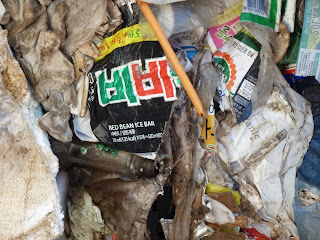EcoWaste Coalition Urges Full Inventory of Mercury-Added Products Targeted for Global Phase-Out
Amid calls for a safe storage program for phased-out mercury-containing medical devices following a mercury spill at Fabella Hospital last month, a toxics watchdog today exhorted the government and the industry to kick off a sweeping inventory of mercury-containing products and stockpiled wastes.
The EcoWaste Coalition aired its plea ahead of the signing of an international treaty on mercury at a Diplomatic Conference to be held in Minamata and Kumamoto, Japan on October 9-11 this year.
Among the treaty provisions to minimize the threat to public health and environment from mercury emissions and releases is the planned phase-out of mercury-added products by 2020, the date after which the manufacture, import or export of certain products shall not be allowed.
The EcoWaste Coalition, which has been tracking mercury in consumer products, urged key government departments and industries to instigate a process even before the treaty is ratified by the Senate in order to gather relevant data on products or product components where mercury is intentionally added.
“With a deadline that is not too far down the road, it will be sensible for our nation to have a real stock-taking of mercury-added consumer products that have to be phased out in compliance with the treaty,” said Aileen Lucero, National Coordinator, EcoWaste Coalition.
“It will be wise to consider a quicker phase-out to prevent a potential scenario where the local market becomes a dumping ground for unwanted mercury-added products from overseas to be phased out or disposed of,” she added.
“The faster the inventories are completed and verified, and phase-out policies agreed upon, the better we prevent this scenario from occurring,” she stated.
Robust inventories will further guide the government in the performance of its regulatory functions to ensure the environmentally-sound management of mercury-added products and wastes, including their safe storage and disposal, the EcoWaste Coaliton pointed out.
The inventory, the EcoWaste suggested, should provide a mechanism that will encourage concerned citizens and public interest groups to submit inputs, as well as report on movements of mercury-added products as well as wastes.
Citing the treaty text, the EcoWaste Coalition emphasized that nothing “prevents a Party from taking additional domestic measures consistent with the provisions of this Convention in an effort to protect human health and the environment from exposure to mercury.”
“This simply means that our country can have more progressive phase-out targets if only to safeguard the well-being of our people and environment,” Lucero said.
The Philippines already bans cosmetics such as skin whitening products with mercury above the allowable limit of 1 ppm following the ASEAN Cosmetics Directive, the EcoWaste Coalition noted.
The Department of Health through Administrative Order 2008-0021 declared the gradual phase-out of mercury-based medical devices in all health care facilities and institutions by 2010, which was supplemented by the Department of Interior and Local Government’s Memorandum Circular 2010-140 enjoining local government executives and other officials to support the said policy, the group said.
Among the mercury-containing products to be phased out by 2020 as listed in Annex A of the mercury treaty include:
1) batteries (except for button zinc silver oxide batteries with a mercury content < 2%, button zinc air batteries with a mercury content < 2%);
2) compact fluorescent lamps (CFLs) equal to or less than 30 watts containing more than 5 mg mercury per bulb;
3) linear fluorescent lamps (LFLs) such as triband lamps less than 60 watts and containing greater than 5 mg mercury and halophosphate lamps less than 40 watts and containing greater than 10 mg mercury;
4) cosmetics with mercury content above 1 part per million, including skin lightening soaps and creams, and not including eye area cosmetics where mercury is used as a preservative and no effective and safe substitute preservatives are available;
5) pesticides, biocides, and topical antiseptics; and
6) non-electronic devices such as barometers, hygrometers, manometers, thermometers, and sphygmomanometers.
The EcoWaste Coalition is a national network of over 150 public interest groups pursuing just and sustainable solutions to waste, climate and chemical issues towards the envisioned goal of Zero Waste by 2020.
-end-
Reference:
Please click to read the mercury treaty text:
http://www.unep.org/
(please go to Annex A, page 61 to see the list of mercury-containing products to be phased out by 2020)





Comments